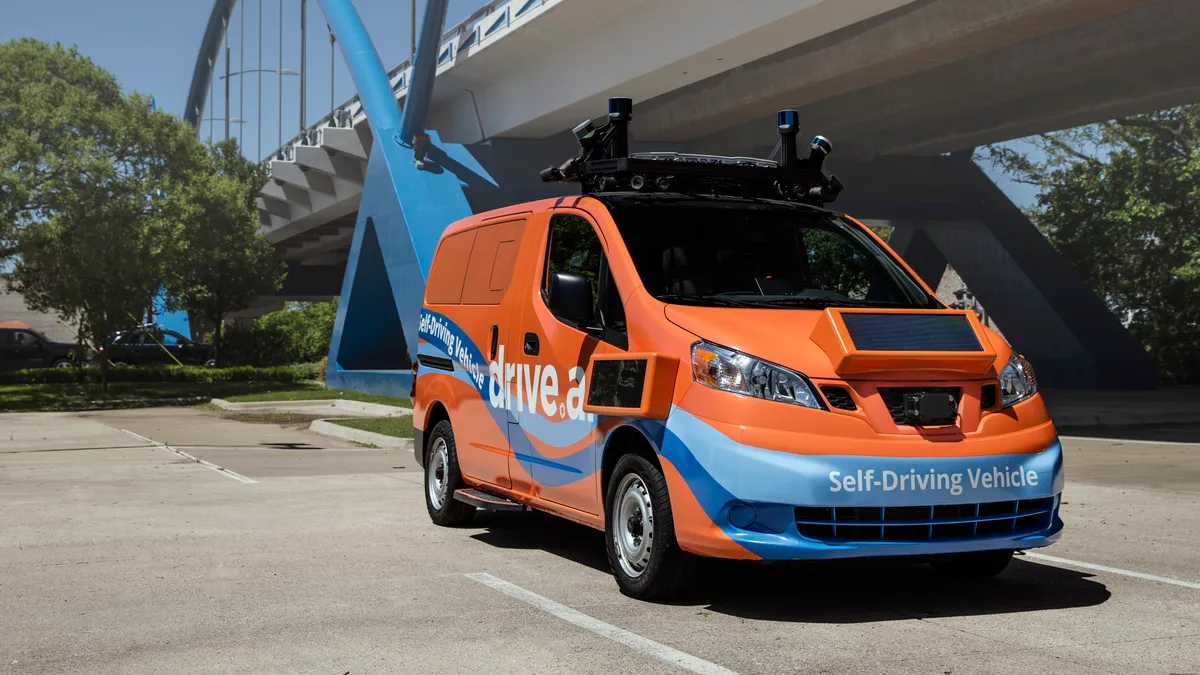UPDATE, June 26, 2019: Apple confirmed Tuesday it has acquired self-driving startup Drive.ai for an undisclosed amount, according to reports from Reuters, Axios and others.
The move comes just days before Drive.ai planned to permanently close. The company, which was once valued at $200 million, has 90 employees, according to the San Francisco Chronicle.
Axios reported that Apple purchased Drive.ai's autonomous vehicles and "other assets," however it is unclear how many Drive.ai employees Apple will retain.
The acquisition helps to solidify Apple's wavering commitment to autonomous vehicle development and research. In March, Apple announced it would lay off 190 employees from its self-driving car unit, but changed its tune in April when it sought suppliers for LiDAR sensors.
Dive Brief:
- Apple is in the process of acquiring self-driving shuttle startup Drive.ai to bring in its engineering talent, according to a report by The Information.
- The report — which cites two sources familiar with the talks — says "dozens" of Drive.ai engineers could move to Apple’s autonomous vehicle (AV) arm, although it’s unclear how many would be hired or what division Apple is scouting. Drive.ai has been seeking a buyer for months, according to previous reports.
- Drive.ai has tested autonomous shuttles that drive on fixed routes through pilots in Texas cities like Frisco, though its website now lists Arlington, TX as the only city it's currently serving.
Dive Insight:
Apple’s ambitions to enter the autonomous vehicle market remain shrouded in secrecy, and it's unclear if the tech giant is working on AV software or building an actual vehicle. The reported interest in Drive.ai comes just three months after Apple announced that it would lay off 190 employees from its self-driving car unit, a shakeup that largely affected the engineering team.
More recently, Reuters reported that the company was seeking out LiDAR suppliers. The redirection comes under the orders of Doug Field, who re-joined Apple as Vice President of Special Projects earlier this year after working at Tesla Motors.
The company has, however, been ramping up its public tests. According to reports filed with the State of California, Apple self-driving cars notched nearly 80,000 miles of testing last year, the third-most of any company permitted in the state, although the rate of disengagements indicates that its technology trails its competitors.
Drive.ai’s work with autonomous shuttles fits into what’s been one of the most public-facing uses of AV technology. The company’s bright orange vans — which include LED screens to communicate to drivers and pedestrians what the shuttles were doing — follow fixed routes. The pilots were seen as a good test case to get people comfortable with AV technology, and show how self-driving cars could supplement public transit.
An acquisition by Apple would presumably redirect the company’s engineering work in AV software to a personal vehicle, since Apple has not signaled interest in shuttles or vans.











